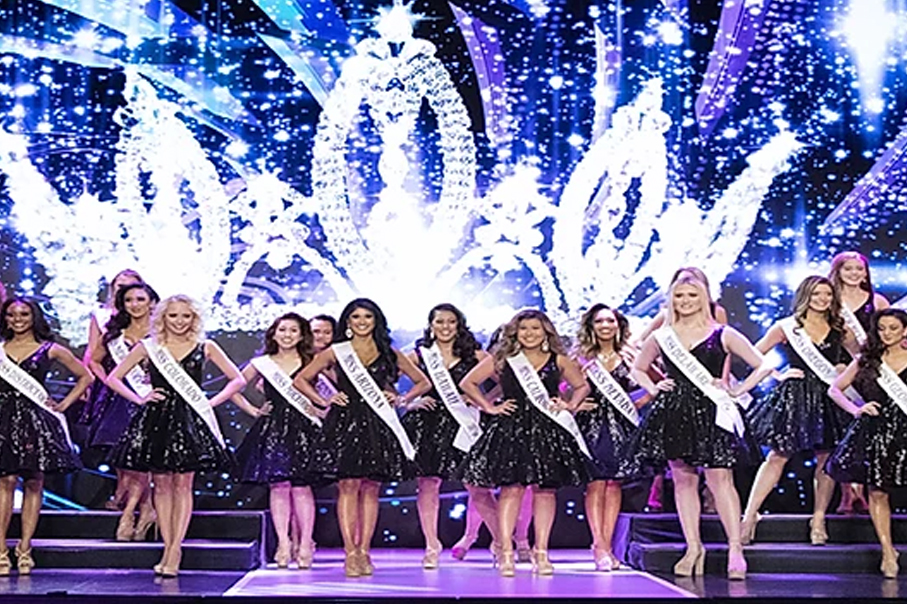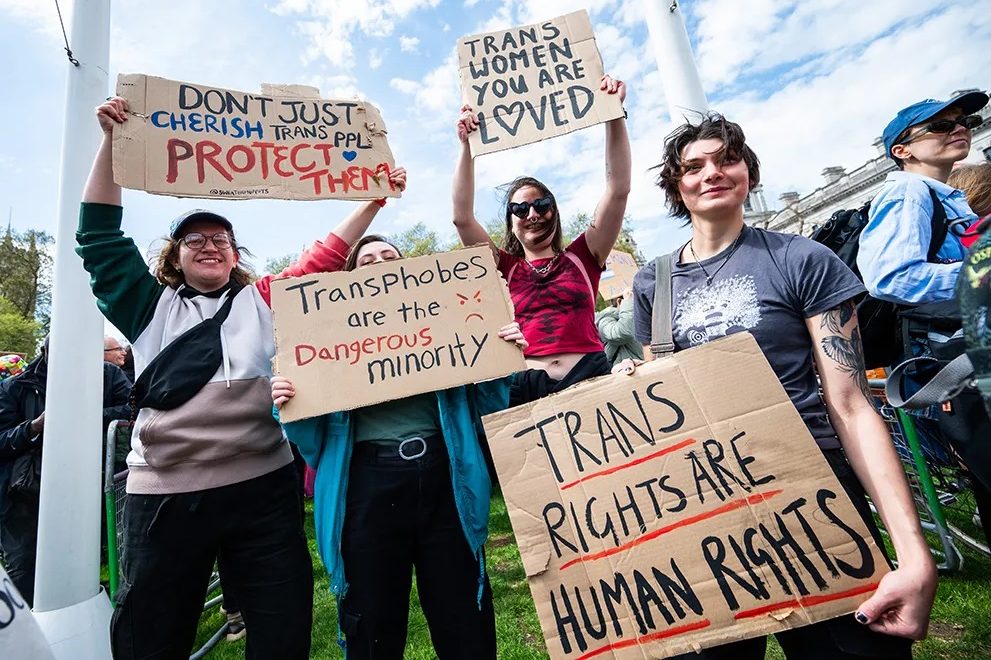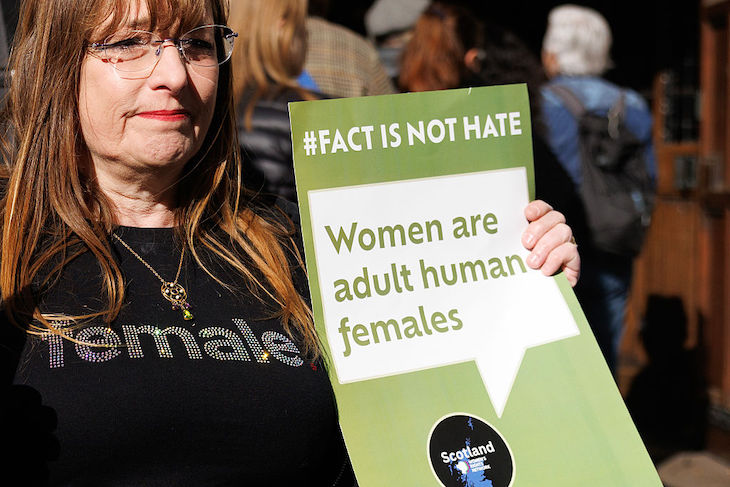The question of how we will finally achieve true equality has finally been answered. For centuries, feminists have been struggling to ensure women and men are treated fairly and equitably. Little did they know the final arena determining an end to their fight would be the beauty pageant. Last month, a trans-identified male from Portland, Oregon sued the Miss United States Of America Pageant for barring transgender women from competing.In truth, the pageant does not specifically exclude transwomen from participating, but rather males. According to the Miss USA website, in order to be eligible to compete, you must be a ‘natural born female’. Because of this rule, Anita Green, who was not born female,filed a gender-identity discrimination lawsuit in the US District Court for Oregon on December 17. The lawsuit argues that the policy is ‘intentionally designed to exclude the specific class to which plaintiff belongs — transgender females’. And that this ‘is discriminatory because it denied plaintiff the full and equal advantages and privileges of defendant’s services in violation of Oregon’s public accommodations law.’It is an odd thing to get your head around…the notion that preventing men from accessing equal objectification amounts to ‘discrimination’. Over 50 years ago, in 1968, feminists protested Miss America on the basis that the event embodied women’s oppression. In a press release, New York Radical Women, the group that organized the protest, invited women to ‘protest the image of Miss America, an image that oppresses women in every area in which it purports to represent us’. This was the first radical feminist action to garner attention from mass media, and it was one of the main events sparking the second wave women’s liberation movement. Reflecting back, in 2003, Carol Hanisch, a member of New York Radical Women, told radio producer Fran Luck:‘I think what we were really challenging was this uniform of women’s inferior sex-class status, these high heels and skirts and all these female trappings that were not only physically inhibiting and painful, they were right out there reminding both men and women of women’s inferior position.’Today, this has all been reversed, and we are told that true liberation can exist only when everyone has equal access to the trappings of femininity.  This new rallying cry, ‘Equal objectification for all!’ would have been read as ridiculous until recently, when gender identity ideology came along and spun decades of feminist work on its head, and insisted that, in fact, up is down, black is white, and of course men are women.‘I felt as though I was being invalidated,’ Green told Willamette Week. ‘I felt as though the organization was saying I am not a woman and I’m not woman enough.’So while feminists have long insisted that a woman is not defined by her ability to walk in a straight line as well as in a circle while in heels and a bikini, today, we are to believe the very opposite: that in order to be a ‘real’ woman, you must embrace and be judged by sexist standards.Non-discrimination laws were not established in order to ensure males had the right to participate in traditionally sexist practices. They were established in order to ensure (in the case of sex-based discrimination) that women had the opportunity to live autonomous lives and participate fully in public life — for example, to have access to university educations, political positions, property ownership, and employment, as well as to vote. It is not a human right to be judged on your ability to pull off a bedazzled evening gown.The motivations behind this lawsuit are odd. Green, who works for a video game company, contacted Tanice Smith, United States of America Pageants and Miss Oregon director, on Facebook, asking for information about the pageant. After reading over the rules and regulations, Green told Smith, ‘You know I’m transgender, right?’ Smith explained that this disqualified Green and offered to help the 29-year-old find another pageant. Green asked Smith to change the rules, but the pageant director declined, so Green responded, ‘I’ll talk to my attorney about this then because discrimination is unacceptable. This is clearly discrimination.’I wonder why, exactly, it is necessary for Green to compete specifically in this competition. There are numerous beauty pageants that do allow transwomen to compete, including Miss Universe, which began allowing trans-identified males as contestants in 2012 after Jenna Talackova, a self-identified transwoman, hired Gloria Allred and threatened to sue.A key problem with lawsuits like this is that trans-identified males are not a specific class of people, as there is no clear definition of a ‘transwoman’ — it is simply a male who says he is a woman. And literally any man can do this. All you have to do is add ‘she/her’ to your Twitter bio or scream ‘it’s “maam”’ at a video store clerk. The ‘discrimination’, therefore, is against men. And, to be honest, I would be more than happy to welcome men into the Miss USA pageant, were I in charge. If granting men their God-given right to twirl a baton in a sequined bodysuit is what it takes to end sexism, sign me up. But, if that is the case, I insist Green’s lawyers alter the language of the suit to reflect this truth. Let us fight this injustice on fair grounds, and, at long last, end the suffering of men who look just as good in a spray tan as we do.Meghan Murphy is a writer in Vancouver, BC. Her website is Feminist Current.
This new rallying cry, ‘Equal objectification for all!’ would have been read as ridiculous until recently, when gender identity ideology came along and spun decades of feminist work on its head, and insisted that, in fact, up is down, black is white, and of course men are women.‘I felt as though I was being invalidated,’ Green told Willamette Week. ‘I felt as though the organization was saying I am not a woman and I’m not woman enough.’So while feminists have long insisted that a woman is not defined by her ability to walk in a straight line as well as in a circle while in heels and a bikini, today, we are to believe the very opposite: that in order to be a ‘real’ woman, you must embrace and be judged by sexist standards.Non-discrimination laws were not established in order to ensure males had the right to participate in traditionally sexist practices. They were established in order to ensure (in the case of sex-based discrimination) that women had the opportunity to live autonomous lives and participate fully in public life — for example, to have access to university educations, political positions, property ownership, and employment, as well as to vote. It is not a human right to be judged on your ability to pull off a bedazzled evening gown.The motivations behind this lawsuit are odd. Green, who works for a video game company, contacted Tanice Smith, United States of America Pageants and Miss Oregon director, on Facebook, asking for information about the pageant. After reading over the rules and regulations, Green told Smith, ‘You know I’m transgender, right?’ Smith explained that this disqualified Green and offered to help the 29-year-old find another pageant. Green asked Smith to change the rules, but the pageant director declined, so Green responded, ‘I’ll talk to my attorney about this then because discrimination is unacceptable. This is clearly discrimination.’I wonder why, exactly, it is necessary for Green to compete specifically in this competition. There are numerous beauty pageants that do allow transwomen to compete, including Miss Universe, which began allowing trans-identified males as contestants in 2012 after Jenna Talackova, a self-identified transwoman, hired Gloria Allred and threatened to sue.A key problem with lawsuits like this is that trans-identified males are not a specific class of people, as there is no clear definition of a ‘transwoman’ — it is simply a male who says he is a woman. And literally any man can do this. All you have to do is add ‘she/her’ to your Twitter bio or scream ‘it’s “maam”’ at a video store clerk. The ‘discrimination’, therefore, is against men. And, to be honest, I would be more than happy to welcome men into the Miss USA pageant, were I in charge. If granting men their God-given right to twirl a baton in a sequined bodysuit is what it takes to end sexism, sign me up. But, if that is the case, I insist Green’s lawyers alter the language of the suit to reflect this truth. Let us fight this injustice on fair grounds, and, at long last, end the suffering of men who look just as good in a spray tan as we do.Meghan Murphy is a writer in Vancouver, BC. Her website is Feminist Current.
The new next frontier of feminism: letting men compete in Miss USA
It is not a human right to be judged on your ability to pull off a bedazzled evening gown

The Miss USA pageant
The question of how we will finally achieve true equality has finally been answered. For centuries, feminists have been struggling to ensure women and men are treated fairly and equitably. Little did they know the final arena determining an end to their fight would be the beauty pageant. Last month, a trans-identified male from Portland, Oregon sued the Miss United States Of America Pageant for barring transgender women from competing.In truth, the pageant does not specifically exclude transwomen from participating, but rather males. According to the Miss USA website, in order to be eligible to compete,…
Comments
Share
Text
Text Size
Small
Medium
Large
Line Spacing
Small
Normal
Large
























